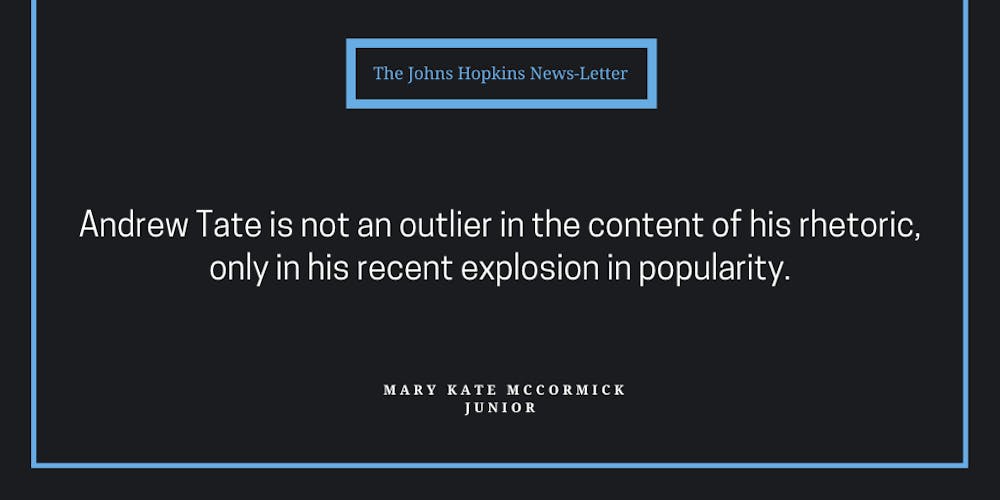I hardly need to introduce Andrew Tate. The controversy surrounding his name is difficult to miss. The 35-year-old former kickboxer, who gained notoriety through streaming and social media platforms, is known for saying atrocious things such as “I’m not a f**king rapist, but I like the idea of just being able to do what I want” while explaining why he moved to Romania and that women must “bear some responsibility” for being sexually assaulted.
Since many of Tate’s fans are young men, his ideas have been of special concern for parents and teachers. It seems that few average adults will openly side with what he says, even if some members of the “manosphere” utter similar sentiments under their breath. But maybe the latter sort of person is exactly why people like Andrew Tate are ideologically dangerous.
Tate was recently banned from most major social media platforms, each of which citing their terms against discrimination or hate speech. But does Andrew Tate’s ban demonstrate a society without tolerance for misogyny or reveal a poorly-concealed promotion of it? Are social media platforms at fault for Tate’s rise to fame?
It must firstly be acknowledged that, yes, social media platforms are inarguably a good place for radicalism and hate to fester, if for no other reason that they draw attention. Social media algorithms encourage two primary attributes of favored content: engagement and posting frequency. While the engagement-focused algorithms themselves might be free of conscience (and, therefore, of moral blame), the social media companies that employ them are not.
Misogyny is one of the most acceptable and common forms of bigotry in online rhetoric. You would be hard-pressed to find other types of hate left to spread without any sort of punishment from Twitter or other social media companies, even if only for them to save face. For all of their posturing, companies like Twitter, Facebook and Tiktok are first and foremost concerned with the same thing as every other company: profit. So, yes, social media is at least partially to blame for the cultivation of people like Andrew Tate — and their insidious invasion of the general public’s feeds.
Now, this is not to say that social media alone can solve the issue of people like Andrew Tate. For the most part, he’s been banned from every major platform, leaving him to run with his tail between his legs to fringe far-right platforms of virtually no relevance.
The fundamental problem is: Andrew Tate is not an outlier in the content of his rhetoric, only in his recent explosion in popularity. In fact, I would be willing to bet that a not-insignificant fraction of the people infuriated by Tate subconsciously perpetuate the driving cultural sentiments behind his tirades. It’s how we’ve been taught to think and behave since we were infants.
Boys and men are told they have less control over their aggression, that they have different innate characteristics and that we therefore cannot hold them accountable for everything they do. We continue to instill in our youth that “boys will be boys,” even if it’s no longer en vogue to say explicitly. But when Tate says the same, plus a few unnecessary F-bombs and disparaging comments about women, suddenly he’s written about in every political culture war column.
Much of what Tate says is not new, special or unheard of. He just so happens to say it in a way that appeals to large groups of people and infuriates others. He does it in a way that garners attention. What we can take from this is to be aware — not only of our social media engagement but of the cultural and ideological reinforcements of what we are consuming. We are, no matter how passively, a larger part of a helpful or harmful political and media body.
It’s also worth noting that pop “girlboss” feminism doesn’t exactly fix the issue of widespread misogyny. The Andrew Tates of the world won’t be eliminated once we have more female CEOs. Intersectional and ideologically coherent feminism that focuses on more than surface-level issues needs to be implemented on social media and in our daily lives. Calling our female peers “queens” and wearing “girl power” merchandise is not the radical statement we might be led to think it is.
So, yes, Andrew Tate has been exorcized from the social media space for the most part, but his quotes — regurgitation of prevalent misogynistic ideas — are not lost. They still fester among us, permeate day-to-day conversations in most cultures and may even slip from our own lips despite our best intentions. I do not pretend to know the all-encompassing solution to this problem and likely neither do you. Andrew Tate was only a particularly obnoxious symptom of this issue, and recognizing that is, at the very least, a start.
Mary Kate McCormick is a junior from Phoenix, Ariz. majoring in Film and Media Studies.





